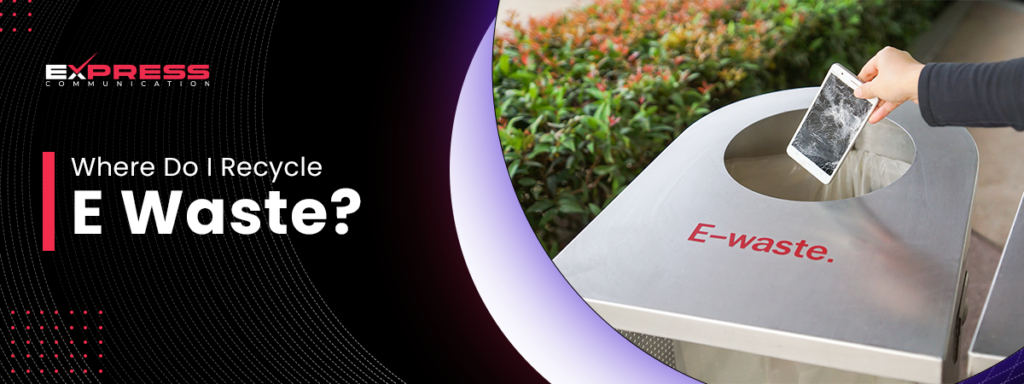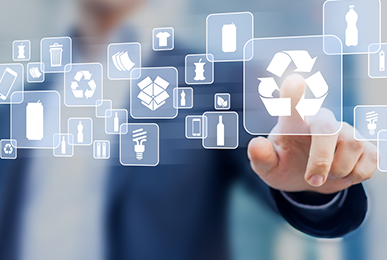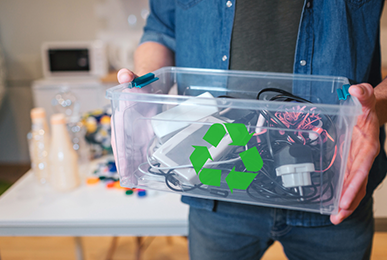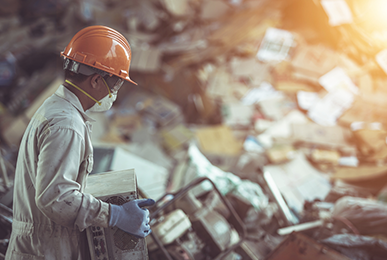
In today’s rapidly advancing digital world, electronic devices have become inseparable companions in our daily lives. From the smartphones that keep us connected to the world to the laptops and tablets that fuel our productivity and the myriad of other gadgets that entertain and assist us, technology is omnipresent. However, this digital boon is not without its environmental cost. As these devices reach the end of their lifecycle, they transition from invaluable tools to electronic waste, or e-waste, posing a significant threat to our environment and health. This brings us to the pivotal question: Where do I recycle e-waste?

Table of Contents
What is E-Waste Recycling?
E-waste recycling involves dismantling, sorting, and processing electronic devices to recover valuable materials that can be reused in the manufacturing of new products. This process reduces the volume of raw materials extracted and processed, which, in turn, decreases the environmental footprint of new electronic production.
However, the process of recycling e-waste is not as straightforward as recycling paper or plastic. Electronics are complex devices made from a myriad of materials, some of which are hazardous. Therefore, they require specialized recycling facilities that can safely and effectively extract valuable components and dispose of the toxic elements in a manner that complies with environmental regulations.
Why is E-Waste Increasing?
E-waste encompasses a wide range of discarded electronic and electrical devices, from the obvious phones and computers to less thought-of items like batteries and home appliances. The rapid pace of technological innovation and the consequent obsolescence of electronics have led to a staggering increase in e-waste globally. This isn’t just a matter of landfill space; e-waste contains hazardous substances like lead, mercury, and cadmium, which can leach into the earth and water, damaging ecosystems and posing health risks to humans and wildlife alike.
Moreover, within these discarded gadgets lie precious metals and valuable materials that are finite and expensive to mine. Recycling e-waste not only prevents harmful pollutants from entering the environment but also conserves natural resources and reduces the need for raw material extraction.
How to Recycle E-Waste The Right Way?
So, where do I recycle e-waste? The good news is, that as public awareness about the importance of e-waste recycling grows, so do the options for responsibly disposing of unwanted electronics. Here are some initial pointers:
1. Manufacturer and Retailer Take-Back Programs
Many electronics manufacturers and retailers have initiated take-back programs that allow consumers to return used devices. These programs often provide an in-store drop-off option or a mailing service to send your e-waste directly to the company for recycling. Participating in these programs ensures that your e-waste is handled according to the manufacturer’s knowledge of the device, maximizing the recovery of valuable materials and proper disposal of hazardous ones.
2. Municipal Electronic Recycling Collections
Local government or community organizations frequently host e-waste collection events or have designated drop-off locations where residents can bring their electronic waste. These programs are often free of charge and can handle a wide variety of electronic items, ensuring they are recycled or disposed of responsibly.
3. Certified E-Waste Recyclers
For a more comprehensive solution, certified e-waste recyclers specialize in the processing and recycling of electronic waste. These facilities adhere to strict environmental and health standards, ensuring that your e-waste is recycled in the most environmentally friendly way possible. By choosing a certified recycler, you can have peace of mind knowing that your electronic waste is not contributing to environmental degradation or human health risks.
Participating in E-Waste Recycling Efforts
Having established the avenues through which e-waste can be recycled, the next step is understanding how to participate effectively in these recycling efforts. Participation not only involves recycling your e-waste but also raising awareness and influencing the recycling behaviors of others.
Identifying E-Waste
Firstly, it’s vital to recognize what constitutes e-waste in your home or workplace. Beyond the obvious smartphones and computers, consider other electronics such as DVD players, electronic toys, small appliances, and even cables or batteries. Identifying these items can significantly increase the amount of e-waste you recycle.
Preparation for Recycling
Before recycling, ensure that your device is ready for the process:
- Data Erasure: For devices that store personal information, perform a factory reset and use specialized software to wipe the device, if possible.
- Separation: If you’re savvy and it’s safe, separate batteries and remove any non-electronic components. Batteries, in particular, may need to be recycled separately due to their hazardous materials.
Locating Recycling Points
For manufacturer and retailer take-back programs, check the company’s website or contact customer service for instructions. For municipal and certified recycler options, a quick online search can reveal local e-waste recycling events, permanent collection sites, and certified recycling facilities.

Challenges in E-Waste Recycling
Addressing e-waste recycling isn’t without its hurdles. These challenges can range from logistical issues to broader systemic problems:
- Awareness and Accessibility: Many people remain unaware of the importance of e-waste recycling or the available options for recycling within their community.
- Complexity of Recycling: The varied and complex composition of modern electronics makes the recycling process challenging and costly, discouraging some from participating.
- Export of E-Waste: The illegal or unethical export of e-waste to developing countries creates severe environmental and health issues, complicating global efforts to manage e-waste responsibly.
Strategies for Effective E-Waste Management
To navigate these challenges and contribute positively, consider these strategies:
- Educate Yourself and Others: Stay informed about the issues surrounding e-waste and share this knowledge with your community. Awareness is the first step toward change.
- Advocate for Responsible Policies: Support legislation and corporate policies that promote sustainable electronics production and recycling. Encourage electronics manufacturers to design products with recycling in mind.
- Reduce, Reuse, Recycle: Apply the three R’s to your electronic usage. Reduce consumption by buying only what you need and choosing durable, repairable products. Reuse by donating functional electronics or selling them. Recycle e-waste through responsible channels.
Looking Ahead
The path to effective e-waste management is multifaceted, involving collective action from individuals, businesses, and governments. As technology continues to evolve, so too must our strategies for dealing with the electronic remnants of our digital age. By staying informed, advocating for responsible practices, and conscientiously recycling, we can each play a part in mitigating the environmental impact of e-waste.
The path to effective e-waste management is multifaceted, involving collective action from individuals, businesses, and governments. As technology continues to evolve, so too must our strategies for dealing with the electronic remnants of our digital age. By staying informed, advocating for responsible practices, and conscientiously recycling, we can each play a part in mitigating the environmental impact of e-waste.




